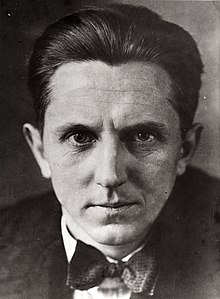Erwin Piscator
| Erwin Piscator | |
|---|---|

Portrait of Piscator, c. 1927
|
|
| Born |
Erwin Friedrich Max Piscator 17 December 1893 Greifenstein-Ulm, German Empire |
| Died | 30 March 1966 (aged 72) Starnberg, West Germany |
| Education | |
| Occupation | Theatre director, producer |
| Known for | Founded the Dramatic Workshop at The New School for Social Research (1940). |
| Notable work | The Political Theatre (1929) |
| Style | Epic Theatre, Documentary theatre |
| Spouse(s) |
Hildegard Jurczyk (m. 1919) Maria Ley (m. 1937) |
| Partner(s) | Bertolt Brecht |
| Relatives | Johannes Piscator |
| Signature | |
 |
|
Erwin Friedrich Maximilian Piscator (17 December 1893 – 30 March 1966) was a German theatre director and producer and, along with Bertolt Brecht, the foremost exponent of epic theatre, a form that emphasizes the socio-political content of drama, rather than its emotional manipulation of the audience or on the production's formal beauty.
Erwin Friedrich Max Piscator was born on 17 December 1893 in the small Prussian village of Greifenstein-Ulm, son of Carl Piscator, a merchant, and his wife Antonia Laparose. His family was descended from Johannes Piscator, a Protestant theologian who produced an important translation of the Bible in 1600. The family moved to the university town Marburg in 1899 where Piscator attended the Gymnasium Philippinum. In the autumn of 1913, he attended a private Munich drama school and enrolled at University of Munich to study German, philosophy and art history. Piscator also took Arthur Kutscher's famous seminar in theatre history which Bertolt Brecht was also later to attend. He began his acting career in the autumn of 1914, in small unpaid roles at the Munich Court Theatre, under the directorship of Ernst von Possart. In 1896, Karl Lautenschläger had installed one of the world's first revolving stages at that theatre.
...
Wikipedia
